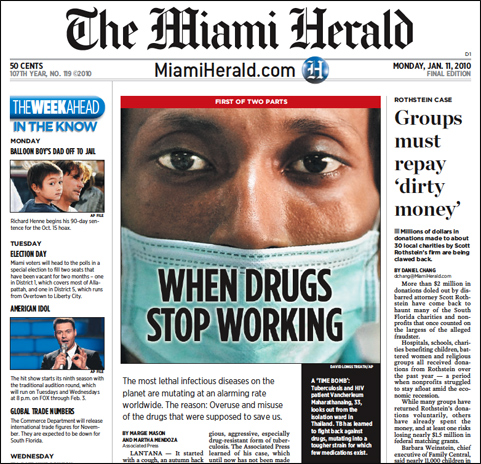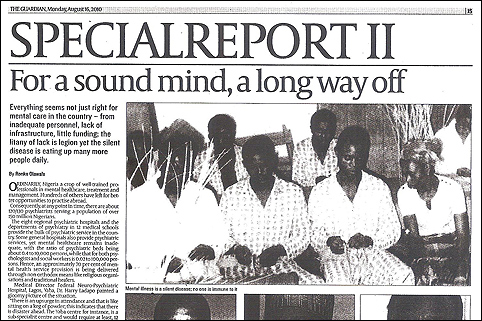Global Health Reporting Fellowship
A major U.S. journalism prize, a new partnership to support international news coverage and Harvard’s president Drew Faust
declaring global health one of her “very highest priorities” were a few of the highlights for the Nieman Global Health Reporting Fellowship program this past year.
This specialized fellowship brings two highly qualified journalists to Harvard each fall to focus on global health issues for an academic year before embarking on a four-month, hands-on reporting project in the developing world.
Since the program began in 2006, Nieman Global Health Fellows have consistently produced
groundbreaking, award-winning reports. The highest recognition for the kind of reporting this fellowship enables, came again this year when “When Drugs Stop Working,” a five-part series by Margie Mason, a 2009 Nieman Global Health Reporting Fellow, and her Associated Press colleague Martha Mendoza, won a
Science in Society Journalism Award.

The two reporters had traveled to four continents to report on the alarming growth in drug-resistant diseases and show how drug resistance is a global, not a local threat. Mason’s research at Harvard led her to discover the first U.S. case of extremely drug-resistant tuberculosis in the United States, which became a major element of the series. “To be recognized by our peers in science journalism,” said Mason after receiving the award at a ceremony at Yale University, “makes this one very special.” Mason and Mendoza also were recognized with a National Headliner Award (health/medical science writing category, third place) and a Deadline Club Award (finalist for the Daniel Pearl Award for Investigative Reporting by newspapers or wire services).
Also in 2010, the Nieman Foundation
joined forces with the
Pulitzer Center on Crisis Reporting to increase the output and impact of our global health field reporting and to learn more about Pulitzer’s innovative ways of creating community around topics of interest, both online and through outreach events.
When announcing the collaboration, Nieman curator Bob Giles said, “This new venture will benefit not only Nieman Global Health Fellows but many other reporters covering international events and issues. We are grateful for the support of the Pulitzer Center and we are looking forward to working together to help shine a spotlight on topics that are too often neglected by the media today.”
The new partnership is underwritten by a grant from Pulitzer, which will cover the cost of the fieldwork for 2011 Nieman Global Health Fellows Antigone Barton and Helen Branswell as well as for their counterparts in 2012 and 2013. In collaboration with the Nieman Foundation, the Pulitzer Center also will assist global health fellows in planning and placing their reporting projects.
Making Connections at Harvard
The Nieman Global Health Reporting Fellowship is a unique addition to
Harvard's global health related research, education and engagement programs. Harvard is currently the only university in the world that, through this kind of fellowship, includes journalistic inquiry and storytelling in its efforts to comprehensively recognize, study and address global health issues.
Around campus, Nieman Fellows learn from experts in the field and offer journalistic insight and their reporting experience to classroom discussions, projects and conversations. Once they have started their fieldwork projects, the fellows bring insightful, comprehensive global health reporting back to their audiences.
One recent example comes from 2009 Global Health Fellow Ronke Olawale. As a reporter for
The Guardian in Nigeria, Olawale had reported on many global health issues prior to her Nieman Fellowship, from responses to the AIDS epidemic in Nigeria to the collapse of primary care to corruption and health worker shortages at local hospitals. Inspired by her conversations with
Arthur Kleinman, a professor of medical anthropology in social medicine and professor of psychiatry at Harvard, she selected an entirely different subject for her fieldwork: The state of mental health in three African nations, Tanzania, Liberia and Nigeria.
In groundbreaking seven-part series published in
The Guardian from August 15-22, 2010, Olawale delivers a mix of investigative and explanatory reporting on the subject. Part I, for example, explains the concept of mental health, the need to care for people affected by mental illness and how lack of treatment burdens families, communities and the economy.

Other parts of the series narrate what it is like to work in one of Nigeria’s few psychiatric care centers, where doctors see “between 400 and 450 new cases daily.” (There are about 130 psychiatrists serving a population of over 150 million Nigerians.) Olawale also examines how a new health care bill, aimed at improving the antiquated colonial law still in place in the country, was buried in the Nigerian House of Representatives in 2003 and never brought back; how drug abuse threatens the future of young adults throughout West-Africa; how patients have been treated and reconnected with their families successfully; and how community care — as pioneered by the Nigerian psychiatrist Dr. Thomas Lambo in the 1940’s — has emerged as a promising model to provide affordable and sensible care for the mentally ill in Africa.
“This was the hardest project I have ever done,” says Olawale of her reporting. “The state of mental health in Africa is worse than anything I have covered before. The neglect is much more systematic than what we see with other diseases.”
Filmmaker and 2010 Nieman Fellow in Global Health Reporting Hopewell Rugoho Chin’ono has returned to his native Zimbabwe, where he has worked for South Africa’s e.tv. He has produced news pieces on the changes Zimbabwe’s Government of National Unity made regarding how hospitals procure their drugs in an effort to crack down on a system of corruption and kick-backs; and on efforts by the new Zimbabwean health minister aimed at retaining health workers (doctors, nurses and pharmacists) by asking local companies to help with incentives such as inexpensive housing, free car services or free television satellite subscriptions.
For his fieldwork, Chin’ono has focused on filming and producing a one-hour documentary that takes an in-depth look at the long-term health consequences of armed rebels using rape as a weapon of war. This is a practice that devastated communities in Rwanda in the 1990’s and is currently affecting thousands of women and children in the Democratic Republic of Congo. While at Harvard, Chin’ono worked closely with
Jennifer Leaning, professor of the practice of health and human rights at Harvard’s School of Public Health and others involved in humanitarian responses to the crisis in the Congo.
While at Harvard, Chin’ono also finished his documentary “A Violent Response,” an insider’s view of the post-election violence that spread in Zimbabwe after the 2008 elections. Mostly reported undercover before leaving for his Nieman year in Cambridge, his film describes the immense difficulties faced by those opposing Zimbabwe’s President Robert Mugabe and includes shocking scenes of injury and death in the country's hospitals and prisons. The film was a finalist in the feature category at the
2010 Rory Peck Awards, where the judges praised Chin’ono’s courage and determination.
– Stefanie Friedhoff
Special Projects Manager